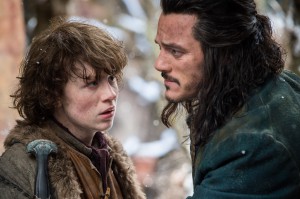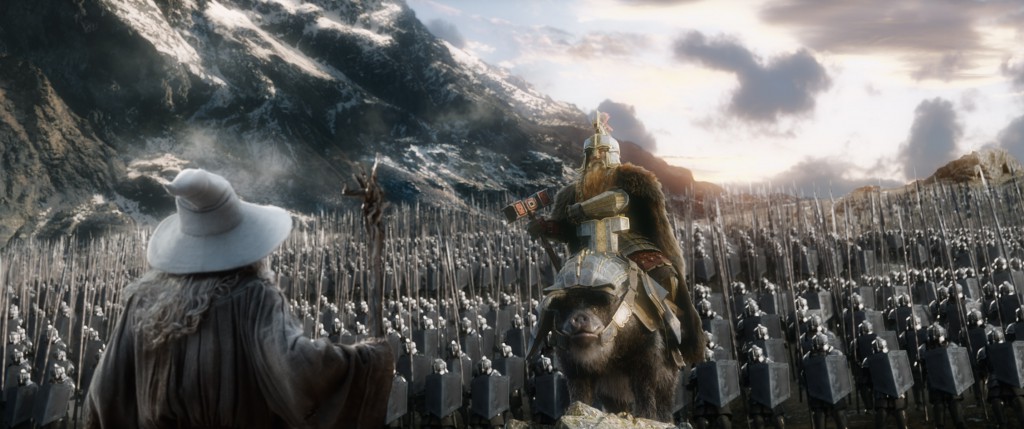‘The Hobbit: The Battle of the Five Armies’—Combat Fatigue Sets In.
Has it really been 13 years?
It seems like only yesterday that Frodo and Samwise were setting off on their adventure, and director Peter Jackson was beginning to unfurl his Lord of the Rings series. But that was 2001 and here we are in 2014 as Jackson concludes his visit to Middle Earth with The Hobbit: The Battle of the Five Armies.
You know what? That’s a lot of time spent in a world where personal hygiene doesn’t seem to be a big priority.
As you may or may not know, J.R.R. Tolkien wrote some fantasy books several decades ago. Three of them, The Fellowship of the Ring, The Two Towers, and The Return of the King were eventually filmed by Jackson who, rightfully, won worldwide acclaim for his artistic audacity, vision, and skill. During the height of filming in New Zealand, it was estimated that one out of every 40 inhabitants of that island nation was working on the movies.
By 2003 the whole thing was over and everybody went back to their lives. Except …
Inevitability Strikes Again, Inevitably
Except there was no way a film franchise which raked in more than $1 billion was ever going to be allowed to disappear—especially since there was another book, The Hobbit, standing as a prequel to the Tolkien trilogy. After a legal battle over directors, studios, and rights that was so lengthy and Byzantine it could be its own film trilogy, The Hobbit—with Jackson at the helm—made its debut in 2012.
But there’s a twist. Whereas The Hobbit was just one children’s lit book, Jackson split it into three epic movies: An Unexpected Journey, The Desolation of Smaug, and now this Battle of the Five Armies.
I’d give you some of the backstory about how we ended up at this battle but, honestly, I can’t really remember. I do recall the first film had a bunch of dwarves descending on the home of Bilbo Baggins, played by Martin Freeman with his customary skill. At the instigation of the wizard Gandalf, Bilbo agrees to help the dwarves find a way into a mountain where a vast treasure is hidden.
And then the rest of that movie, and Desolation, featured Bilbo, the dwarves, some elves and all their assorted hijinks.

Bard (Luke Evans, R) has to save the day, which Bain (John Bell) agrees is gonna be a tough job all right. (Photo by Mark Pokorny.)
So when this film opens there’s a big fire-breathing dragon wreaking vengeance on a little town and it’s up to Luke Evans playing someone named Bard to save them. Meanwhile Bilbo and the dwarves are holed up in a castle fortress filled with gold and the dwarf king, Thorin, is going crazy with gold-lust. (And, in the role, Richard Armitage should win a gold in the Brooding Olympics.)
Then we cut to Gandalf in a cage somewhere far away. Sir Ian McKellen is back as Gandalf and does this neat thing—he can give an enormously gifted performance while at the same time being incredibly hammy. That’s not a complaint, by the way, since I think he’s just brilliant. Cate Blanchett, Hugo Weaving, and Christopher Lee—from the LOTR movies—make cameo appearances and fight with the Eye of Sauron.
Beyond that it all gets quite confusing. The Elf King wants some of the gold, as do Bard and the villagers, but Thorin’s just about lost his mind and Bilbo has something called an Arkenstone which everybody wants and then an army of dwarves shows up and just when they’re about to fight each other Orcs and Goblins pop up out of the ground. So now you’ve got your five armies ready to go: People, Dwarves, Elves, Orcs, and Goblins. And the battle is joined!
Most of this movie is that battle (not surprisingly since the clue’s in the title) and heavens, they do fight on. And on. And on, using all kinds of weapons and doing it in all kinds of ways. The point is that they just keep hacking away at each other for a considerable length of time.
Meet the New Battle, Same as the Old Battles
Walt Disney used to offer his animators $25 for every “gag” they could come up with. These were brief little bits having nothing to do with the story but good for a quick laugh. I imagine that Jackson must have done the same sort of thing; the guys down in special effects (and you know they were men) would get a special reward for every gag they could think of. Except these gags don’t involve laughs; they are all the different ways to behead or dismember someone. I can’t say it’s pleasant, but it is innovative—something the film greatly needs.

Gandalf (Ian McKellen, in the signature hat) is as brilliant as ever, and dwarf Dain (Billy Connolly) looks very cool astride that beast … but the legions massed beyond them tell you that you’ve seen this drill before. (Photo courtesy of Warner Bros. Pictures)
Because the problem with Battle is that it feels like a “Greatest Hits” compilation of the previous five movies—the questing hobbit, the avuncular wizard, thwarted elf love, a possessed king … and endless computer-generated fight scenes.
A thing I’ve noticed about LOTR battles is that they follow a similar schematic. The murderous hordes of grotesque villains attack a vastly outnumbered group of plucky heroes. The orgy of CGI mayhem is intercut with brief updates of what’s happening to your favorite characters on the front lines, then back to the big picture where it seems like all hope has finally been lost …
… and then some supernatural event occurs and the good guys win. It might be Gandalf showing up at sunrise, it might be an army of dead warriors, it could be the earth opening up and swallowing the evil ones, but it comes out of the blue and renders everything before it pointless. It doesn’t matter how big your army is or how strong or how lethal—the outcome is always decided by a magic trick.
It’s the same routine here and, after 13 years, it’s a little tiresome. What’s the point of paying attention if the ending has nothing to do with the beginning? You could conceivably miss the first two hours of Battle and still not miss anything important. That can’t be what Jackson wanted.
Maybe he should have left well enough alone and stopped after Return. As brilliant a filmmaker as he is, it’s important to understand that the Middle Earth saga is, really, a limited story. Here at movie number six there’s no way it wouldn’t all begin to feel repetitive and a little shopworn.
I bow to no one in my admiration for the first three movies in the series, but it’s unlikely the second set of three will supplant those anytime soon.
Ted Hoover is a Pittsburgh-based writer and critic.
Share on Social Media
Follow Entertainment Central
Latest Stories
Sign up for the EC Newsletter







